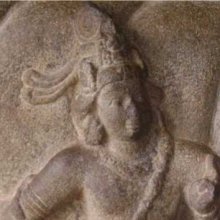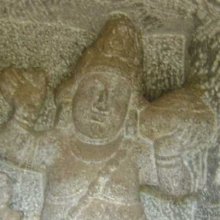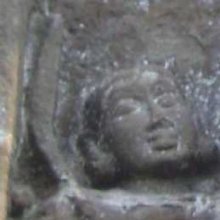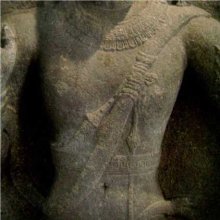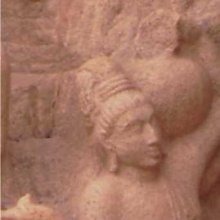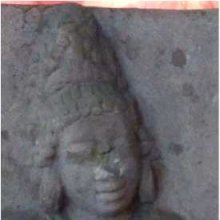Vastra, Vāstra: 30 definitions
Introduction:
Vastra means something in Buddhism, Pali, Hinduism, Sanskrit, Marathi, Hindi, biology. If you want to know the exact meaning, history, etymology or English translation of this term then check out the descriptions on this page. Add your comment or reference to a book if you want to contribute to this summary article.
Vastra has 30 English definitions available.
Images (photo gallery)
(+3 more images available)
Languages of India and abroad
Sanskrit dictionary
[Deutsch Wörterbuch]
Source: Cologne Digital Sanskrit Dictionaries: Böhtlingk and Roth Grosses Petersburger WörterbuchVastra (वस्त्र):—(von 3. vas) [UJJVAL.] zu [Uṇādisūtra.4,158.] n. [Siddhāntakaumudī 249,b,3.] m. (dieses nicht zu belegen) und n. gaṇa ardharcādi zu [Pāṇini’s acht Bücher 2, 4, 31.] Gewand, Kleid; Zeug, Tuch [Amarakoṣa 2, 6, 3, 17. 3, 4, 26, 204.] [Hemacandra’s Abhidhānacintāmaṇi 666.] [Halāyudha 2, 393. 5, 85.] vasiṣva.vastrāṇi [Ṛgveda 1, 26, 1.] bhadra [134, 4. 3, 39, 2. 5, 29, 15. 1, 140, 1. 152, 1. 2, 14, 3.] vastrā pu.rāya mā.aro vayanti [5, 47, 1. 6, 47, 23. 9, 8, 6. 96, 1.] [Atharvavedasaṃhitā 5, 1, 3. 9, 5, 25. 12, 3, 21. 14, 2, 41.] [The Śatapathabrāhmaṇa 3, 3, 3, 4.] [Kātyāyana’s Śrautasūtrāṇi 14, 1,20. 2, 29.] kṛṣṇa [Kauśika’s Sūtra zum Atuarvaveda 47. 57.] vadhū [ĀŚV. GṚHY. 1, 8, 12.] eka [GOBH. 3, 2, 42.] [Pāraskara’s Gṛhyasūtrāṇi 3, 10.] [Manu’s Gesetzbuch 3, 52. 9, 219. 11, 188.] hīnānnavastraveṣa adj. [2, 194.] [Mahābhārata 3, 2310. 2730.] [Rāmāyaṇa 2, 32, 16. 52, 82.] [Varāhamihira’s Bṛhajjātaka S. 41, 2. 46, 15.] kṣauma [54, 108.] pīta [WEBER, KṚṢṆAJ. 291.] [Vetālapañcaviṃśati] in [Lassen’s Anthologie (III) 8, 22. 17, 18.] svanite vastraparṇānām [Amarakoṣa 1, 1, 6, 2.] vastrāpahāraka [Manu’s Gesetzbuch 11, 51.] gopīnāṃ vastraharaṇam [PAÑCAR. 1, 11, 6.] tadvastramarajaḥ prāvṛṇot [Mahābhārata 3, 2997.] sūkṣmavastramavakṣipya munivastrāṇyavasta ha [Rāmāyaṇa 2, 37, 7.] paridhāna [Oxforder Handschriften 86,b,13. fg.] sūkṣmavastradhara (jaghana) [Mahābhārata 3, 1827.] sitavastroṣṇīṣadhara [Varāhamihira’s Bṛhajjātaka S. 43, 30.] divyavastradhara [Brahmapurāṇa] in [Lassen’s Anthologie (III) 54, 3.] dhāraṇa [Oxforder Handschriften 267,b,9.] mṛtavastrabhṛt [Manu’s Gesetzbuch 10, 35.] mūrkho pi śobhate tāvatsabhāyāṃ vastraveṣṭitaḥ [Spr. 2225.] vastreṇa veṣṭitaḥ [WEBER, KṚṢṆAJ. 278.] saṃvīta [279.] garbhita [276.] cchanna [Vopadeva’s Grammatik 4, 21.] [Sūryasiddhānta 13, 16.] rāmalakṣmaṇasaṃtrāsaṃ vastraṃ klinnamivātyajat [Rāmāyaṇa 4, 36, 2.] bhoga [Weber’s Verzeichniss No. 590.] pāṭayannijavastrāṇi [Kathāsaritsāgara 18, 250.] ccheda das Zerreissen von Gewändern [Varāhamihira’s Bṛhajjātaka S. 71] in der Unterschr. viccheda [107, 8.] vastrasyāntaḥ [Halāyudha 2, 395.] vastrānta [Mahābhārata 3, 2217.] [Spr. 688.] [Bhāgavatapurāṇa 4, 25, 24.] vastrāñcala [Kathāsaritsāgara 18, 181.] [Hitopadeśa 63, 8.] vastreṇaikena [Rāmāyaṇa 4, 9, 24.] vastrayoryugam ein Oberund Untergewand [Amarakoṣa 2, 6, 3, 14.] cīnadeśajasadvastrayugmāni [Kathāsaritsāgara 43, 75. fg.] [WEBER, KṚṢṆAJ. 255.] yugala [Pañcatantra 29, 16.] vastrāṇāṃ pravarā śāṇī Zeug [Mahābhārata 3, 13027.] cīnāṃśukaṃ cīnadeśodbhavo vastraviśeṣaḥ [Scholiast] zu [Śākuntala 33.] kṛtrimavṛkṣāḥ nānāvastrasamāvṛttāḥ [Rāmāyaṇa 1, 9, 6.] putrikā syādvastradantādibhiḥ kṛtā [Amarakoṣa 2, 10, 29.] parīkṣā [Weber’s Verzeichniss No. 967.] [Suśruta 1, 25, 10.] vastrādhāraka Unterlage von Tüchern [?2, 92, 8 (so ist auch 55, 11] zu lesen und demnach die Anführung unter dhāraka zu streichen). pūtaṃ jalam Seihtuch [Spr. 1232.] gopanāni unter den [64] Kalā [Oxforder Handschriften 217,a,18.] Am Ende eines adj. comp. f. ā [Manu’s Gesetzbuch 9, 70.] [Mahābhārata 1, 4267.] ekavastrā [2, 2216. 3, 2303.] [Spr. 3658.] [Kathāsaritsāgara 21, 114.] — Vgl. antarvastra, uttara, nīla, netra, vi, snāna und unter daśā
1) und yuga 2).
--- OR ---
Vāstra (वास्त्र):—(von vastra) adj. mit Zeug überzogen: ratha [Pāṇini’s acht Bücher 4, 2, 10, Scholiast] [Amarakoṣa 2, 8, 2, 22.] [Hemacandra’s Abhidhānacintāmaṇi 754.]
Sanskrit, also spelled संस्कृतम् (saṃskṛtam), is an ancient language of India commonly seen as the grandmother of the Indo-European language family (even English!). Closely allied with Prakrit and Pali, Sanskrit is more exhaustive in both grammar and terms and has the most extensive collection of literature in the world, greatly surpassing its sister-languages Greek and Latin.
See also (Relevant definitions)
Starts with (+90): Vastrabaddha, Vastrabandha, Vastrabharana, Vastrabhedaka, Vastrabhedin, Vastrabhinnaka, Vastrabhushan, Vastrabhushana, Vastraca Tana, Vastracchanna, Vastracheda, Vastrachheda, Vastrada, Vastradana, Vastradanakatha, Vastradasha, Vastradhara, Vastradharaka, Vastradharani, Vastradharin.
Ends with (+107): Abdhivastra, Acchadanavastra, Achchhadanavastra, Adhivastra, Agnishaucavastra, Amtarvastra, Amulyavastra, Anamdavastra, Angavastra, Annavastra, Antarvastra, Ardravastra, Arunavastra, Astaraniyavastra, Aupavastra, Avastra, Batuvastra, Citravastra, Dantavastra, Devamgavastra.
Full-text (+283): Snanavastra, Vastranirnejaka, Netravastra, Vastrayoni, Dantavastra, Antarvastra, Nilavastra, Vastragranthi, Divyavastra, Vastrapaharaka, Adhivastra, Vastragriha, Vivastra, Jirnavastra, Vastrabhedin, Avastrata, Vastrayugma, Vastrayugala, Knopam, Vastrapeshi.
Relevant text
Search found 51 books and stories containing Vastra, Vastrā, Vāstra; (plurals include: Vastras, Vastrās, Vāstras). You can also click to the full overview containing English textual excerpts. Below are direct links for the most relevant articles:
Garga Samhita (English) (by Danavir Goswami)
Verse 6.19.38 < [Chapter 19 - In the First Fortress of Dvārakā, the Glories of Līlā-sarovara, etc.]
Verse 1.17.33 < [Chapter 17 - Description of the Yogurt Theft]
Verse 3.1.18 < [Chapter 1 - The Worship of Śrī Girirāja]
Rig Veda (translation and commentary) (by H. H. Wilson)
The Markandeya Purana (Study) (by Chandamita Bhattacharya)
Dress and Clothing < [Chapter 2]
Vivekachudamani (by Shankara)
Bhakti-rasamrta-sindhu (by Śrīla Rūpa Gosvāmī)
Verse 2.1.349 < [Part 1 - Ecstatic Excitants (vibhāva)]
Verse 2.1.315 < [Part 1 - Ecstatic Excitants (vibhāva)]
Verse 2.5.69 < [Part 5 - Permanent Ecstatic Mood (sthāyī-bhāva)]
